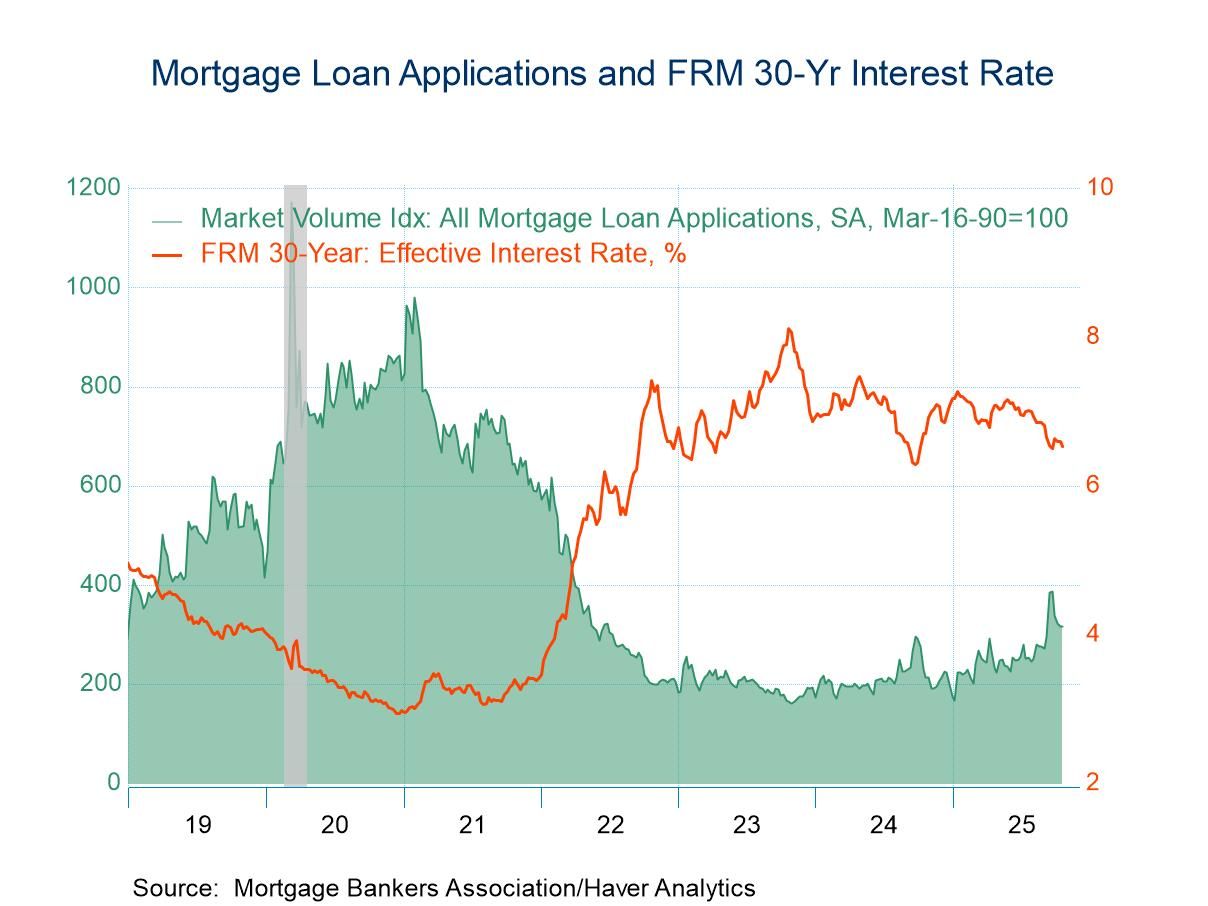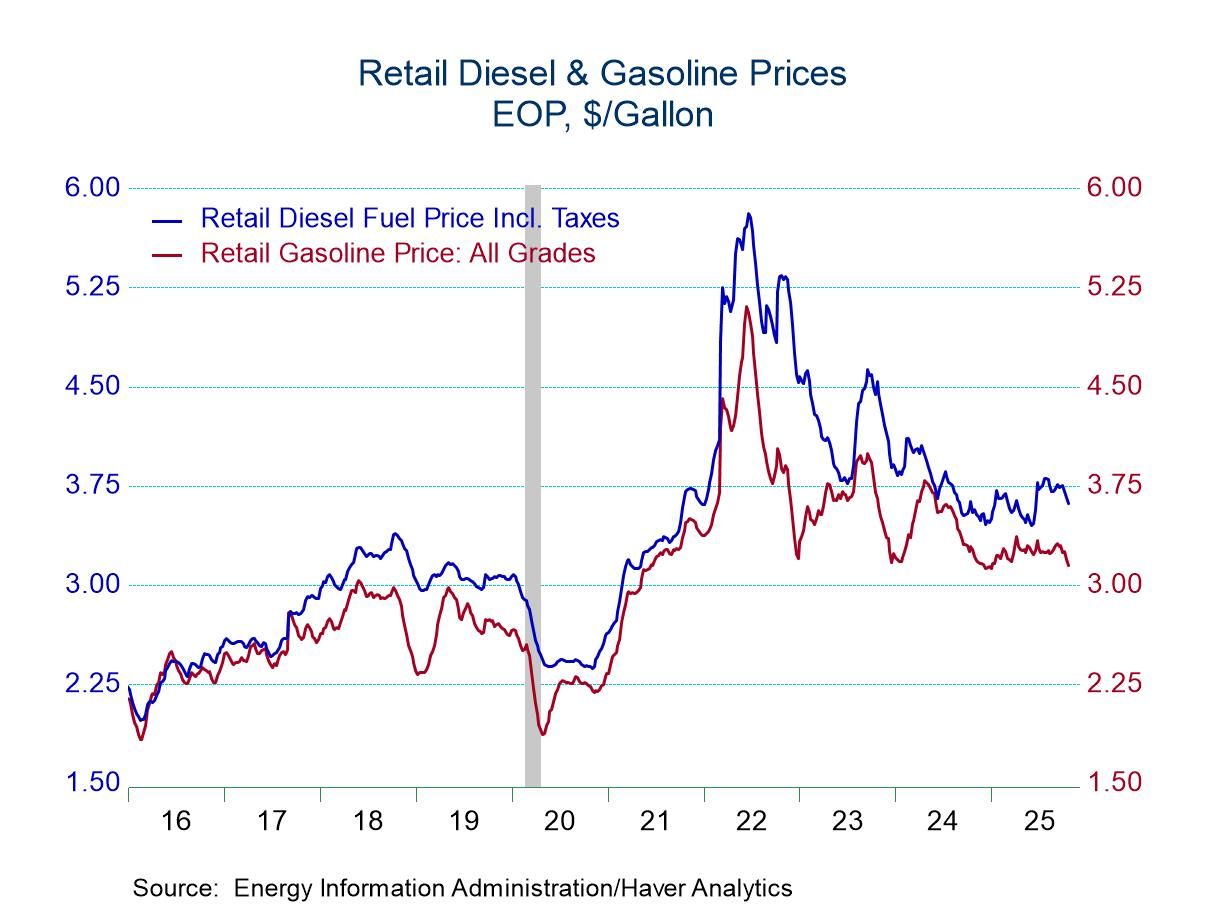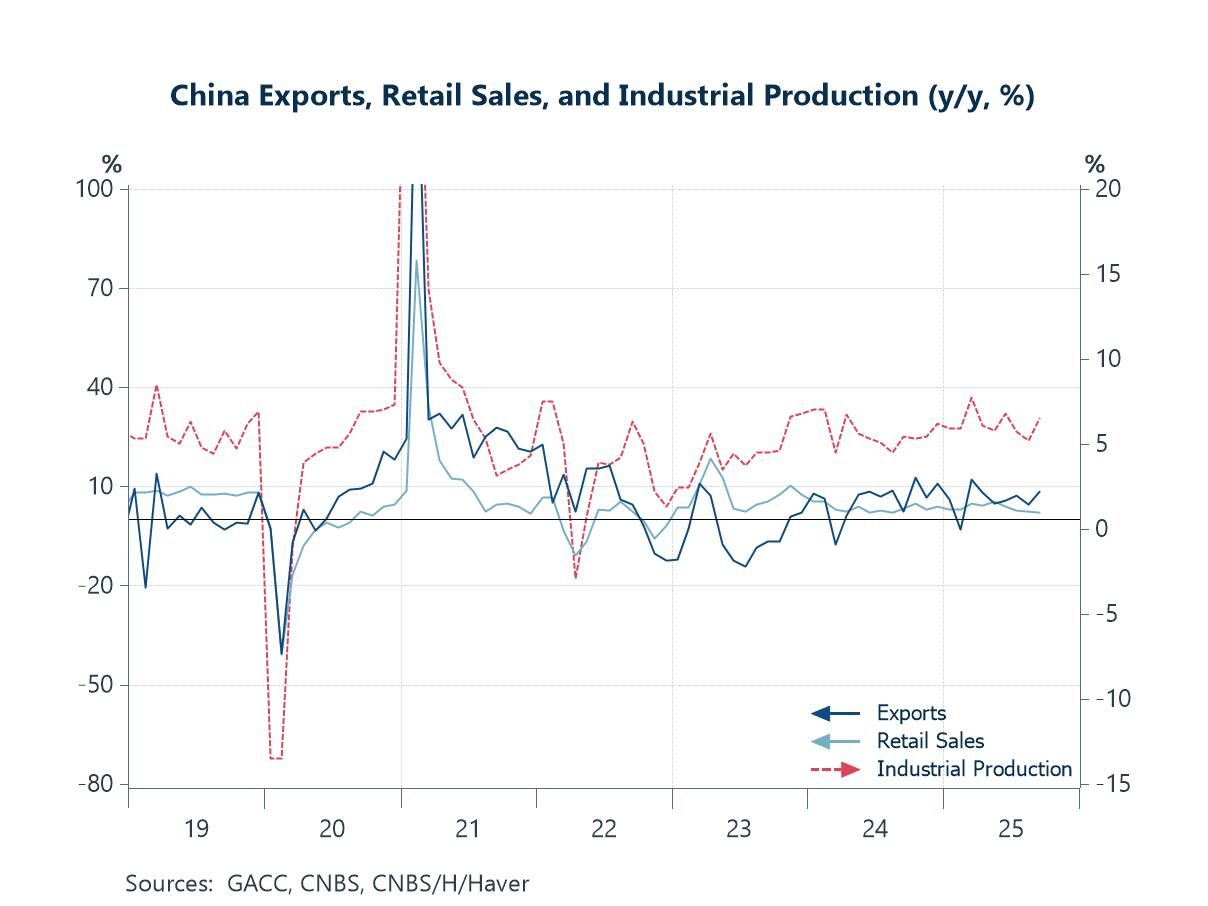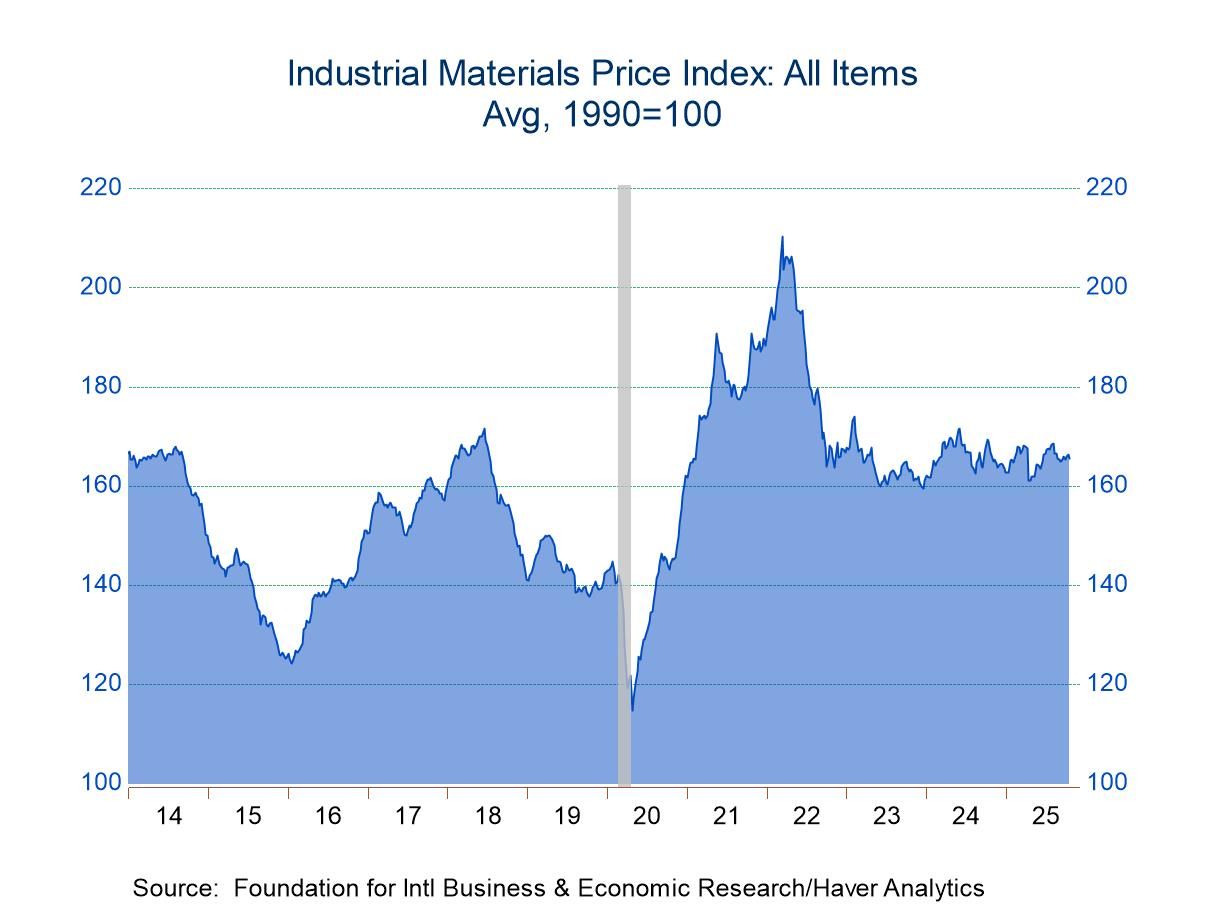 Global| Jan 15 2009
Global| Jan 15 2009U.S. December PPI Fell Again; 2008 Strength in Pricing Abruptly Ends
by:Tom Moeller
|in:Economy in Brief
Summary
U.S. producer prices for finished goods fell 1.9% last month versus expectations for a 2.0% drop. The decline was the fifth in as many months. Nevertheless, 2008 was a year when price increases as a whole were stronger than during [...]
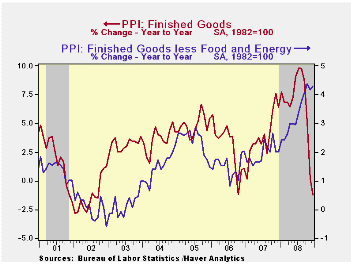 U.S.
producer prices for finished goods fell 1.9% last month versus
expectations for a 2.0% drop. The decline was the fifth in as many
months. Nevertheless, 2008 was a year when price increases as a whole
were stronger than during 2007. The 6.3% increase in the overall
Producer Price Index compared to a 3.9% rise one year earlier and it
was the firmest since 1991. Several month-to-month increases,
which exceeded 1.0% early in 2008, were responsible for that lift.
U.S.
producer prices for finished goods fell 1.9% last month versus
expectations for a 2.0% drop. The decline was the fifth in as many
months. Nevertheless, 2008 was a year when price increases as a whole
were stronger than during 2007. The 6.3% increase in the overall
Producer Price Index compared to a 3.9% rise one year earlier and it
was the firmest since 1991. Several month-to-month increases,
which exceeded 1.0% early in 2008, were responsible for that lift.
Gains in energy prices were responsible for much of the acceleration in the PPI last year. Though they fell 9.3% last month, down for the fifth consecutive month, for all of 2008 they rose 14.0% and that was double the 2007 increase. December-to-December energy prices fell 21.2%. That decline was enough to lower the level of finished energy prices in December to that of mid-2005. Therefore, much more sanguine news on pricing is in the cards for this year.
Finished consumer food prices also eased during the last three months and in December they fell 1.5%. That lowered the December-to-December increase to a moderate 3.8%. Nevertheless, for all of last year food prices rose a strong 6.9% which was about the gain they posted in 2007. Large monthly increases early in the year were responsible for that lift and they were led by a 6.5% rise in meat prices, which was double the 2007 rise, and a 34.5% rise in pasta product prices.
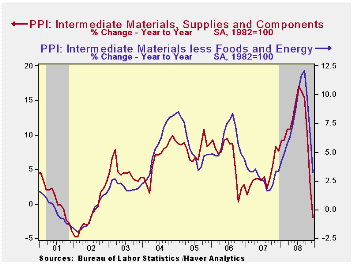 Less food & energy,
prices also firmed in 2008. First, the December increase of 0.2% was
double Consensus expectations. That gain followed a slim 0.1% increase
one month earlier but these followed four consecutive monthly increases
between 0.4% and 0.6%. The y/y rise in the core PPI of 4.3% was nearly
the strongest since late-1989. Prices of core finished consumer goods
rose 0.3% last month and that ended a year when they increased 4.5%
from December-to-December. The gain was the strongest since 1989.
Durable consumer goods prices jumped 0.5% last month and were up 3.2%
y/y. Appliance prices jumped 3.8% y/y, their strongest since 1989,
while core nondurable goods prices strengthened to a 5.6% y/y increase,
also the fastest rise since early 1999. In addition, prices
for capital equipment firmed and rose 4.0%, again the strongest since
1989.
Less food & energy,
prices also firmed in 2008. First, the December increase of 0.2% was
double Consensus expectations. That gain followed a slim 0.1% increase
one month earlier but these followed four consecutive monthly increases
between 0.4% and 0.6%. The y/y rise in the core PPI of 4.3% was nearly
the strongest since late-1989. Prices of core finished consumer goods
rose 0.3% last month and that ended a year when they increased 4.5%
from December-to-December. The gain was the strongest since 1989.
Durable consumer goods prices jumped 0.5% last month and were up 3.2%
y/y. Appliance prices jumped 3.8% y/y, their strongest since 1989,
while core nondurable goods prices strengthened to a 5.6% y/y increase,
also the fastest rise since early 1999. In addition, prices
for capital equipment firmed and rose 4.0%, again the strongest since
1989.
Lower prices for intermediate goods may portend easier price
gains in finished goods prices this year. 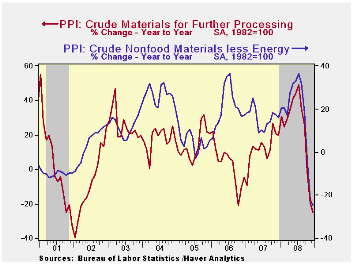 They fell 4.2% last
month and repeating their decline in November. Energy prices
dropped 9.5% (-20.4% y/y). Excluding food & energy,
prices fell for the third consecutive month.
They fell 4.2% last
month and repeating their decline in November. Energy prices
dropped 9.5% (-20.4% y/y). Excluding food & energy,
prices fell for the third consecutive month.
The crude materials PPI was down sharply for the fifth straight month. Energy prices led the fall with a 6.0% (-33.4% y/y) drop and crude food prices fell 5.3% (-13.9% y/y). Less food & energy, crude prices fell 2.2% with the recent drop in commodity prices.
The latest Beige Book from the Federal Reserve which covers regional economic conditions can be found here.
| Producer Price Index (%) | December | November | Y/Y | 2008 | 2007 | 2006 |
|---|---|---|---|---|---|---|
| Finished Goods | -1.9 | -2.2 | -1.2 | 6.3 | 3.9 | 3.0 |
| Core | 0.2 | 0.1 | 4.3 | 3.4 | 1.9 | 1.5 |
| Intermediate Goods | -4.2 | -4.3 | -2.0 | 10.5 | 4.1 | 6.4 |
| Core | -3.0 | -2.3 | 3.2 | 7.6 | 2.8 | 6.0 |
| Crude Goods | -5.3 | -12.5 | -24.8 | 21.5 | 12.1 | 1.4 |
| Core | -2.2 | -20.4 | -24.5 | 15.2 | 15.6 | 20.8 |
Tom Moeller
AuthorMore in Author Profile »Prior to joining Haver Analytics in 2000, Mr. Moeller worked as the Economist at Chancellor Capital Management from 1985 to 1999. There, he developed comprehensive economic forecasts and interpreted economic data for equity and fixed income portfolio managers. Also at Chancellor, Mr. Moeller worked as an equity analyst and was responsible for researching and rating companies in the economically sensitive automobile and housing industries for investment in Chancellor’s equity portfolio. Prior to joining Chancellor, Mr. Moeller was an Economist at Citibank from 1979 to 1984. He also analyzed pricing behavior in the metals industry for the Council on Wage and Price Stability in Washington, D.C. In 1999, Mr. Moeller received the award for most accurate forecast from the Forecasters' Club of New York. From 1990 to 1992 he was President of the New York Association for Business Economists. Mr. Moeller earned an M.B.A. in Finance from Fordham University, where he graduated in 1987. He holds a Bachelor of Arts in Economics from George Washington University.



